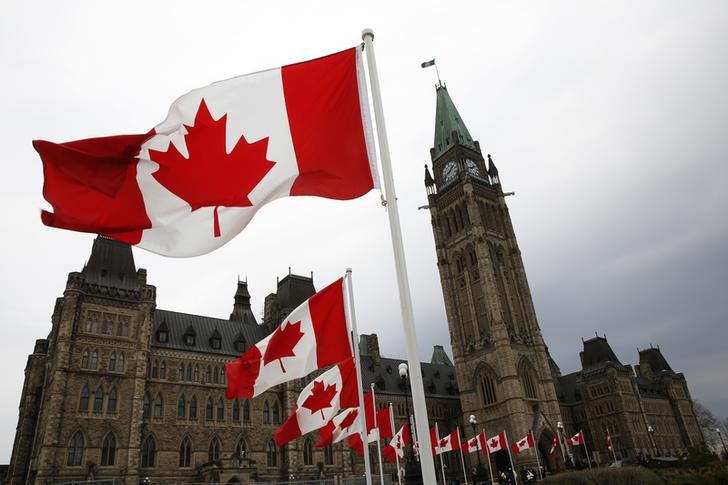OTTAWA, Dec 3 (Reuters) - Canada's new Liberal government
said on Thursday it would set up a non-partisan process to
advise on appointments to the country's unelected Senate in a
move to reform the scandal-plagued institution.
Canada's Parliament includes both an elected House of
Commons and the Senate, whose members are appointed until age
75. There have been calls for its abolition in recent years
after a number of senators were accused of abusing their expense
accounts.
The Senate is dubbed the chamber of "sober, second thought,"
but there is the unwritten convention that it not defeat
important government legislation, particularly on confidence
matters such as the budget, raising questions as to its
usefulness.
The Liberal Party, elected to power in October, last year
expelled senators from their parliamentary caucus to try to make
the Senate less partisan.
The government on Thursday said that under the new
appointment process, an independent advisory board will use
merit-based criteria to present Prime Minister Justin Trudeau
with a list of five people for him to choose from to fill each
Senate vacancy.
One consequence of Trudeau's having expelled the Liberal
Senators from his caucus is the challenge of who will introduce
government legislation to ensure it can pass both houses and
become law.
Dominic LeBlanc, leader of the government in the House of
Commons, said that one of Trudeau's first Senate appointees
would be named the government's representative in the Senate,
filling the role traditionally filled by the leader of the
government in the Senate.
The Liberal plan ran into quick opposition, with British
Columbia Premier Christy Clark tweeting that her province would
not participate in the process to appoint senators.
The federal plan envisaged having provincial participation
on the advisory board, but Clark said Thursday's changes did not
address the province's concerns. "Senate has never represented
BC's interests at the national level," she said in her tweet.
- English (USA)
- English (UK)
- English (India)
- English (Australia)
- English (South Africa)
- English (Philippines)
- English (Nigeria)
- Deutsch
- Español (España)
- Español (México)
- Français
- Italiano
- Nederlands
- Português (Portugal)
- Polski
- Português (Brasil)
- Русский
- Türkçe
- العربية
- Ελληνικά
- Svenska
- Suomi
- עברית
- 日本語
- 한국어
- 简体中文
- 繁體中文
- Bahasa Indonesia
- Bahasa Melayu
- ไทย
- Tiếng Việt
- हिंदी
Canada gov't sets non-partisan process for Senate appointments

Latest comments
Install Our App
Risk Disclosure: Trading in financial instruments and/or cryptocurrencies involves high risks including the risk of losing some, or all, of your investment amount, and may not be suitable for all investors. Prices of cryptocurrencies are extremely volatile and may be affected by external factors such as financial, regulatory or political events. Trading on margin increases the financial risks.
Before deciding to trade in financial instrument or cryptocurrencies you should be fully informed of the risks and costs associated with trading the financial markets, carefully consider your investment objectives, level of experience, and risk appetite, and seek professional advice where needed.
Fusion Media would like to remind you that the data contained in this website is not necessarily real-time nor accurate. The data and prices on the website are not necessarily provided by any market or exchange, but may be provided by market makers, and so prices may not be accurate and may differ from the actual price at any given market, meaning prices are indicative and not appropriate for trading purposes. Fusion Media and any provider of the data contained in this website will not accept liability for any loss or damage as a result of your trading, or your reliance on the information contained within this website.
It is prohibited to use, store, reproduce, display, modify, transmit or distribute the data contained in this website without the explicit prior written permission of Fusion Media and/or the data provider. All intellectual property rights are reserved by the providers and/or the exchange providing the data contained in this website.
Fusion Media may be compensated by the advertisers that appear on the website, based on your interaction with the advertisements or advertisers.
Before deciding to trade in financial instrument or cryptocurrencies you should be fully informed of the risks and costs associated with trading the financial markets, carefully consider your investment objectives, level of experience, and risk appetite, and seek professional advice where needed.
Fusion Media would like to remind you that the data contained in this website is not necessarily real-time nor accurate. The data and prices on the website are not necessarily provided by any market or exchange, but may be provided by market makers, and so prices may not be accurate and may differ from the actual price at any given market, meaning prices are indicative and not appropriate for trading purposes. Fusion Media and any provider of the data contained in this website will not accept liability for any loss or damage as a result of your trading, or your reliance on the information contained within this website.
It is prohibited to use, store, reproduce, display, modify, transmit or distribute the data contained in this website without the explicit prior written permission of Fusion Media and/or the data provider. All intellectual property rights are reserved by the providers and/or the exchange providing the data contained in this website.
Fusion Media may be compensated by the advertisers that appear on the website, based on your interaction with the advertisements or advertisers.
© 2007-2024 - Fusion Media Limited. All Rights Reserved.